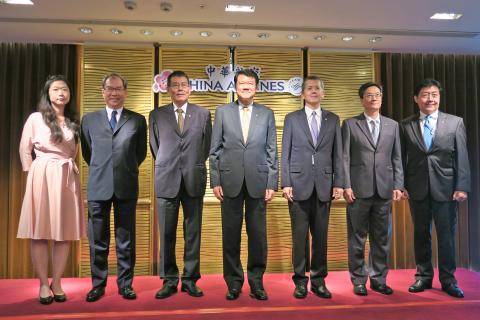China Airlines Ltd (CAL, 中華航空) yesterday said it has fully recovered from the losses stemming from a flight attendants’ strike in June and outlined plans to revitalize its business.
“Our overall passenger load factor reached 81.2 percent in July and 82.6 percent last month,” CAL chairman Ho Nuan-hsuan (何煖軒) told a news conference in Taipei.
Ho said the company is confident that its third-quarter earnings would top its domestic peers.

Photo: Kan Chi-chi, Taipei Times
“I do not have regrets about doing what had to be done,” Ho said, referring to the concessions he approved to end the strike.
“The concessions are in line with government regulations,” Ho said. “Those who participated in the strike are still my colleagues and it is vital to preserve amicable relations.”
Losses stemming from the one-day strike were estimated at NT$500 million (US$15.75 million), CAL said in June, adding that its annual payroll costs would increase by NT$550 million.
The nation’s largest carrier canceled 67 flights departing from Taiwan Taoyuan International Airport or Taipei International Airport (Songshan airport), affecting an estimated 20,000 passengers.
Regarding the mounting losses incurred by Tigerair Taiwan (台灣虎航), a budget airline established with Singapore’s Tiger Airways Ltd, Ho said that the situation is dire.
“The problem stems from questionable contract terms with the Singaporean carrier, which were finalized by the previous management team,” Ho said.
“According to the contract, Tiger Airways, with its 10 percent stake in the venture, reserves the right to veto the decisions by the management team, leaving us with little room to operate,” Ho said.
The Singaporean carrier also said that two of the low-cost carrier’s fleet of nine aircraft may not be leased to other airlines, which limited the company’s asset utilization, he said.
“While we will try to salvage the company by renegotiating the contract with Tiger Airways, we do not rule out closing the low-cost carrier,” he said.
Ho also said that CAL is in talks with EVA Airways Corp (長榮航空) about a partnership to pool resources and reduce costs by cutting redundant allocations.
CAL plans to cut unprofitable flights to improve operating efficiency and allow for more rest time for cabin crews, CAL president Hsieh Shih-chien (謝世謙) said.
The number of weekly flights to Japan have been reduced from 182 to 169, and the company is planning to add more flights to Thailand and Malaysia as part of the government’s “new southbound policy,” Hsieh said, adding that a number of night flights have been canceled as well.
The carrier will deploy its new fleet of Airbus A350 jetliners to destinations such as Vienna, Rome, Frankfurt and Amsterdam, Hsieh said, adding that CAL will focus on high-quality, non-stop flights.
In the first half of this year, CAL’s net income fell by 56.37 percent annually to NT$1.29 billion, with earnings per share of NT$0.24, while sales fell by 5.4 percent annually to NT$68.83 billion.
The declines were due to difficult market conditions, a NT$217 million foreign-exchange loss and lost sales from the strike, CAL said.

CHIP RACE: Three years of overbroad export controls drove foreign competitors to pursue their own AI chips, and ‘cost US taxpayers billions of dollars,’ Nvidia said China has figured out the US strategy for allowing it to buy Nvidia Corp’s H200s and is rejecting the artificial intelligence (AI) chip in favor of domestically developed semiconductors, White House AI adviser David Sacks said, citing news reports. US President Donald Trump on Monday said that he would allow shipments of Nvidia’s H200 chips to China, part of an administration effort backed by Sacks to challenge Chinese tech champions such as Huawei Technologies Co (華為) by bringing US competition to their home market. On Friday, Sacks signaled that he was uncertain about whether that approach would work. “They’re rejecting our chips,” Sacks

NATIONAL SECURITY: Intel’s testing of ACM tools despite US government control ‘highlights egregious gaps in US technology protection policies,’ a former official said Chipmaker Intel Corp has tested chipmaking tools this year from a toolmaker with deep roots in China and two overseas units that were targeted by US sanctions, according to two sources with direct knowledge of the matter. Intel, which fended off calls for its CEO’s resignation from US President Donald Trump in August over his alleged ties to China, got the tools from ACM Research Inc, a Fremont, California-based producer of chipmaking equipment. Two of ACM’s units, based in Shanghai and South Korea, were among a number of firms barred last year from receiving US technology over claims they have

It is challenging to build infrastructure in much of Europe. Constrained budgets and polarized politics tend to undermine long-term projects, forcing officials to react to emergencies rather than plan for the future. Not in Austria. Today, the country is to officially open its Koralmbahn tunnel, the 5.9 billion euro (US$6.9 billion) centerpiece of a groundbreaking new railway that will eventually run from Poland’s Baltic coast to the Adriatic Sea, transforming travel within Austria and positioning the Alpine nation at the forefront of logistics in Europe. “It is Austria’s biggest socio-economic experiment in over a century,” said Eric Kirschner, an economist at Graz-based Joanneum

OPTION: Uber said it could provide higher pay for batch trips, if incentives for batching is not removed entirely, as the latter would force it to pass on the costs to consumers Uber Technologies Inc yesterday warned that proposed restrictions on batching orders and minimum wages could prompt a NT$20 delivery fee increase in Taiwan, as lower efficiency would drive up costs. Uber CEO Dara Khosrowshahi made the remarks yesterday during his visit to Taiwan. He is on a multileg trip to the region, which includes stops in South Korea and Japan. His visit coincided the release last month of the Ministry of Labor’s draft bill on the delivery sector, which aims to safeguard delivery workers’ rights and improve their welfare. The ministry set the minimum pay for local food delivery drivers at